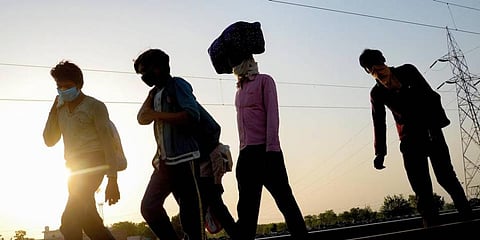

DEHRADUN: The Uttarakhand government is set to conduct an unprecedented survey to gauge the impact of 'reverse migration' in the state, a phenomenon observed significantly during the COVID-19 pandemic.
For the first time, the Rural Development and Migration Prevention Commission will gather detailed data on the status of Uttarakhandis who returned from across India and abroad, focusing on their self-employment ventures and successes.
According to sources, "An estimated 4,000 plus individuals are believed to have returned during this period."
Formed in 2017 to tackle the persistent issue of outward migration from the state's hilly regions, the Commission initially surveyed Pauri district, revealing startling facts about deserted villages.
Subsequent surveys covered Pithoragarh, Tehri, Chamoli, and other districts.
The pandemic-induced lockdown witnessed a large-scale return of expatriate Uttarakhandis to their native villages. To encourage these returnees to stay, the state government launched self-employment schemes offering subsidies, which many embraced based on their experience.
The ongoing comprehensive survey by the Migration Commission will now detail the number of returnees, their entrepreneurial ventures, benefits from government schemes, business gains, and other crucial aspects.
Speaking to TNIE, Dr. Sharad Singh Negi, Vice Chairman of the Uttarakhand Rural Development and Migration Prevention Commission, confirmed, "The survey work on reverse migration in the state is underway. The report will be submitted to the government within two months. It will detail the types of employment adopted by returning Uttarakhandis, their current status, and the challenges they face in self-employment."
Dr. Negi estimated that "around 4,000 migrants who had left for work in India and abroad have returned to their villages and adopted self-employment. Many are earning good profits from agriculture, animal husbandry, tourism, homestays, horticulture, and other sectors. However, the survey will bring to light the precise situation of reverse migration at every village level."
Meanwhile, social activist Anoop Nautiyal, founder of the Social Development for Communities Foundation (SDC), has presented a stark analysis of the broader migration crisis.
"The migration crisis is intensifying," Nautiyal warned. "Between 2008 and 2018, 502,717 people migrated from the state, averaging 50,272 annually. However, between 2018 and 2022, 335,841 people left, translating into 83,960 people shifting annually. This sharp increase is a clear indication that the issue is spiraling out of control."
Nautiyal's findings point to an alarming 67% annual increase in migration rates over the last four years, compared to the previous decade.